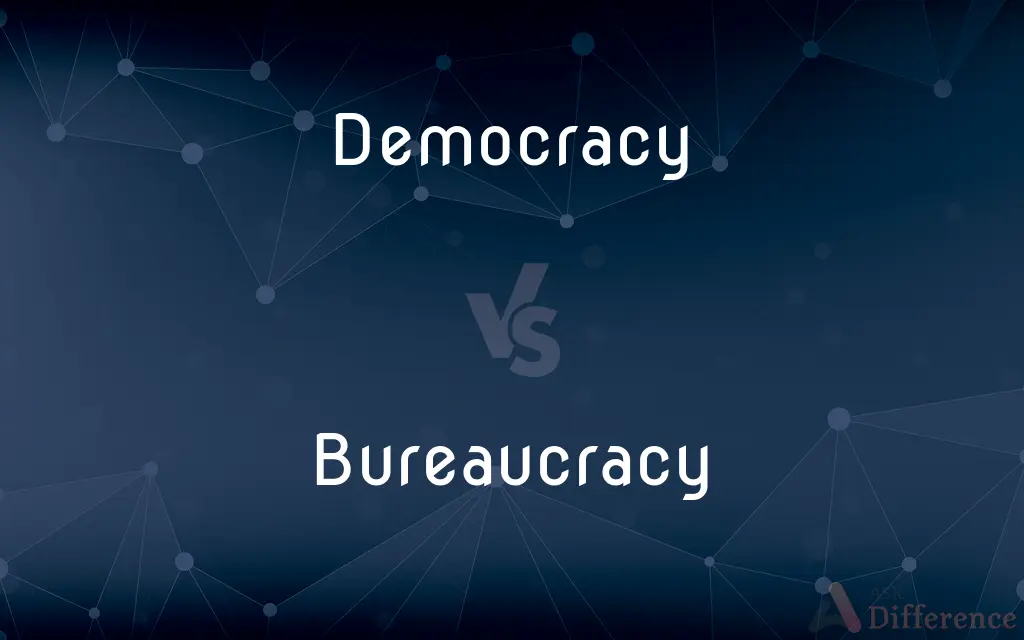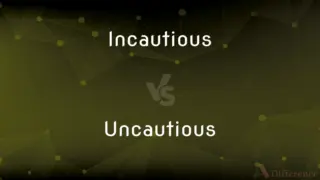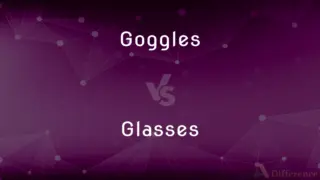Democracy vs. Bureaucracy — What's the Difference?
By Urooj Arif & Maham Liaqat — Updated on April 26, 2024
Democracy emphasizes popular sovereignty and individual freedoms, while bureaucracy focuses on administrative efficiency through structured hierarchy and rules.

Difference Between Democracy and Bureaucracy
Table of Contents
ADVERTISEMENT
Key Differences
Democracy is based on the principle of rule by the people, either directly or through elected representatives, empowering citizens to participate in decision-making. In contrast, bureaucracy operates on a hierarchical system where decisions are made by appointed officials who may not be directly accountable to the public.
In a democracy, policies and laws are developed with the input and consent of the governed, which often makes the system more responsive to public needs. On the other hand, bureaucracy typically follows established procedures and protocols, which can lead to rigidity and slower responses to societal changes.
The democratic process is intended to be transparent and open to scrutiny, which helps in maintaining accountability and fairness. Conversely, bureaucracy can sometimes be opaque, with complex procedures that may not be easily understood by the general public.
Democracies thrive on the diversity of opinions and the free exchange of ideas, fostering a dynamic political culture. Bureaucracy, while necessary for managing large organizations, can sometimes stifle innovation due to its focus on conformity and adherence to rules.
Elections and public debates are crucial components of a democracy, ensuring leaders are answerable to the electorate. Bureaucracies, however, often rely on appointed positions, which can lead to a lack of direct accountability to the voters.
ADVERTISEMENT
Comparison Chart
Basis of Authority
Popular sovereignty
Hierarchical structure
Decision-making
By elected officials or referenda
By appointed officials
Responsiveness
High, subject to public opinion
Low, subject to administrative rules
Transparency
High, with public involvement
Low, often internal processes
Accountability
To the electorate
To higher administrative levels
Compare with Definitions
Democracy
A system of government by the whole population, typically through elected representatives.
The United States is considered a democracy because its government is elected by the people.
Bureaucracy
Excessively complicated administrative procedure.
The application process was bogged down by bureaucracy, requiring numerous forms and approvals.
Democracy
The common people, especially when considered as a political force.
The revolution was led by the democracy, seeking greater rights and freedoms.
Bureaucracy
The officials collectively in such a system.
The bureaucracy was resistant to the proposed changes in policy.
Democracy
The practice or principles of social equality.
Democracy in the workplace means all employees have a say in decision-making.
Bureaucracy
The administrative system governing any large institution.
University students often struggle with the bureaucracy involved in registering for classes.
Democracy
Control of an organization or group by the majority of its members.
The club operates under a democracy, with members voting on all major decisions.
Bureaucracy
A system of government in which most of the important decisions are made by state officials.
Critics argue that bureaucracy slows down innovation due to its many layers of oversight.
Democracy
A state governed under a democratic system.
Denmark is celebrated for its democracy and high level of civic engagement.
Bureaucracy
A state or organization governed or managed as a bureaucracy.
The large corporation functioned like a bureaucracy, with strict rules and procedures.
Democracy
Democracy (Greek: δημοκρατία, dēmokratiā, from dēmos 'people' and kratos 'rule') refers to a form of government in which the people either have the authority to choose their governing legislators, or the authority to decide on legislation. Who is considered part of the people and how authority is shared among or delegated by the people has changed over time and at different speeds in different countries, but more and more of the inhabitants of countries have generally been included.
Bureaucracy
The term bureaucracy () may refer both to a body of non-elected governing officials (bureaucrats) and to an administrative policy-making group. Historically, a bureaucracy was a government administration managed by departments staffed with non-elected officials.
Democracy
Government by the people, exercised either directly or through elected representatives.
Bureaucracy
Administration of a government chiefly through bureaus or departments staffed with nonelected officials.
Democracy
A political or social unit that has such a government.
Bureaucracy
The departments and their officials as a group
Promised to reorganize the federal bureaucracy.
Democracy
The common people, considered as the primary source of political power.
Bureaucracy
Management or administration marked by hierarchical authority among numerous offices and by fixed procedures
The new department head did not know much about bureaucracy.
Democracy
Majority rule.
Bureaucracy
The administrative structure of a large or complex organization
A midlevel manager in a corporate bureaucracy.
Democracy
The principles of social equality and respect for the individual within a community.
Bureaucracy
An administrative system in which the need or inclination to follow rigid or complex procedures impedes effective action
Innovative ideas that get bogged down in red tape and bureaucracy.
Democracy
(uncountable) Rule by the people, especially as a form of government; either directly or through elected representatives (representative democracy).
Bureaucracy
Government by bureaus or their administrators or officers.
Democracy
A government under the direct or representative rule of the people of its jurisdiction.
Bureaucracy
A system of administration based upon organisation into bureaus, division of labour, a hierarchy of authority, etc., designed to dispose of a large body of work in a routine manner.
At that time the administration replaced the system of patronage in the civil service with a bureaucracy.
Democracy
(countable) A state with a democratic system of government.
Bureaucracy
The body of officers and administrators, especially of a government.
Democracy
(uncountable) Belief in political freedom and equality; the "spirit of democracy".
Bureaucracy
Excessive red tape and routine in any administration, body or behaviour.
The head of the civil service promised to clamp down on bureaucracy.
Democracy
Government by the people; a form of government in which the supreme power is retained and directly exercised by the people.
Bureaucracy
A system of carrying on the business of government by means of departments or bureaus, each under the control of a chief, in contradiction to a system in which the officers of government have an associated authority and responsibility; also, government conducted on this system.
Democracy
Government by popular representation; a form of government in which the supreme power is retained by the people, but is indirectly exercised through a system of representation and delegated authority periodically renewed; a constitutional representative government; a republic.
Bureaucracy
Government officials, collectively; - used especially of nonelected government officials.
Democracy
Collectively, the people, regarded as the source of government.
Bureaucracy
Nonelective government officials
Democracy
The principles and policy of the Democratic party, so called.
Democracy
The political orientation of those who favor government by the people or by their elected representatives
Democracy
A political system in which the supreme power lies in a body of citizens who can elect people to represent them
Democracy
The doctrine that the numerical majority of an organized group can make decisions binding on the whole group
Common Curiosities
Why is bureaucracy often seen as less responsive than democracy?
Bureaucracy is bound by rigid rules and procedures, which can slow down responsiveness compared to the more dynamic and adaptable democratic processes.
What are the advantages of a bureaucratic system?
Bureaucracy can provide stability and consistency in administration, which is beneficial for managing large organizations and ensuring compliance with laws.
What is the main difference between democracy and bureaucracy?
Democracy focuses on governance by the people and for the people, while bureaucracy is about administration and often involves complex procedures and hierarchical structures.
Is bureaucracy necessary in a democracy?
Yes, bureaucracy is necessary in any complex society to manage various administrative tasks and ensure the implementation of laws and policies, even within a democratic framework.
Can a democracy have bureaucratic elements?
Yes, most democratic governments include bureaucratic structures to manage state functions and implement laws.
How do citizens participate in a democracy?
Citizens participate in democracy through voting, public consultations, referenda, and by exercising their right to free speech and assembly to influence governmental policies.
How do bureaucratic structures affect public services?
Bureaucratic structures can both support and hinder public services; they provide a framework for delivery but can also lead to inefficiencies and delays if overly complex.
How does decision-making differ in a democracy versus a bureaucracy?
In a democracy, decisions are made based on elections and public opinion, whereas in bureaucracy, decisions are typically made by appointed officials.
What are the advantages of democracy?
Democracy promotes individual freedom, ensures government accountability, and fosters a sense of involvement among citizens in the decision-making process.
What are the disadvantages of bureaucracy?
Bureaucracy can lead to inefficiency, excessive red tape, and a lack of flexibility, making it difficult to adapt to new challenges and public needs.
What is the relationship between democracy and bureaucratic transparency?
In a democracy, there is a higher expectation for bureaucratic processes to be transparent to ensure accountability and maintain public trust.
How does a democratic government control bureaucracy?
Democratic governments use oversight mechanisms such as audits, legislative reviews, and public accountability measures to control and guide bureaucratic actions.
What role do bureaucrats play in a democratic system?
Bureaucrats implement the decisions made by elected officials, manage everyday operations of government departments, and ensure continuity in governance.
Can bureaucracy exist without democracy?
Yes, bureaucracy can exist in various forms of government, including autocracies and oligarchies, where decision-making is concentrated in the hands of a few rather than the general populace.
What are examples of bureaucratic organizations?
Government departments, large corporations, and universities often have bureaucratic structures to handle their administrative and procedural needs.
Share Your Discovery

Previous Comparison
Incautious vs. Uncautious
Next Comparison
Goggles vs. GlassesAuthor Spotlight
Written by
Urooj ArifUrooj is a skilled content writer at Ask Difference, known for her exceptional ability to simplify complex topics into engaging and informative content. With a passion for research and a flair for clear, concise writing, she consistently delivers articles that resonate with our diverse audience.
Co-written by
Maham Liaqat













































